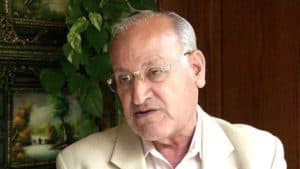Denis korkodinov – Interview with Ribhi Halloum
The decision of US President Donald Trump regarding Jewish settlements on the West Bank has been sharply criticized by Arab leaders. Washington officially admitted that it considers the disputed Israeli settlements in Judea and Samaria to be legitimate. This further angered the Palestinian leadership, which called on its supporters to exert forceful pressure not only on Israel, but also on the United States. The Arab-Israeli confrontation received an additional impetus and once again becomes the subject of heated debate in the international arena.
Specifically for World Geostrategic Insights, we talked about this with the former General Coordinator of the Global March to Jerusalem (“GMJ”), head of the International Executive Committee “GMJ” Ribhi Halloum.

It is worth noting that, until 1971, our guest was the regional organizer of the Palestine Liberation Organization in the United Arab Emirates. In addition, until 1993, he held leading positions in the Revolutionary Council of the militarized organization and political party Movement for the National Liberation of Palestine (“Fatah”), and was also the Palestinian Ambassador to Brazil, Afghanistan, Turkey, the United Arab Emirates and Indonesia. Ribhi Hallum is currently Chairman of the Jordanian Trade Union Committee and Secretary for International Relations at the General Secretariat of the Palestinian Conference Abroad.
1. More recently, US President Donald Trump recognized Israel’s right to settle in Judea and Samaria (West Bank). Such a decision is clearly contrary to international law and constitutes an obstacle to peace. Thus, the UN Security Council, in its resolution 2334, as well as in previous resolutions, which confirm the lack of legal force of bills, such as SCR 465 of 1980, unequivocally confirms Palestine’s right to settle in the West Bank, while the United States took the completely opposite decision. Does this indicate that the Arab-Israeli conflict is largely provoked by the White House administration? Can it be argued that by granting Israel great privileges, Donald Trump expects the Israeli lobby to actively finance his election campaign?
RIBHI HALLOUM – Donald Trump action is based on the purchase and sale, exchange and trade of all the criteria, values, laws and ethics, on which international relations are based. And here we recall that he repeatedly stated that the Gulf states need to pay US $ 40 billion a year in compensation for their American role in protecting Arab political systems. And it was not just a passing election campaign. This was a business project that was put into practice during the first summit conference convened in Riyadh in May 2017, in the presence of leaders of 46 Islamic countries. Donald Trump made this speech: “I told my friend, the king of Saudi Arabia, that you cannot remain on your throne for more than two weeks without our protection, so you must pay us.” This statement very eloquently confirmed that the American president was not initially inclined to pursue a policy, but an interest.
Tel Aaiw had the advantage of seeing its Arab neighbors weakened and completely dependent on the United States. At the same time, Israel actively supported the election campaign of Donald Trump in the hope that he would lobby for the interests of Jews around the world. For this reason, the American president promoted the so-called “deal of the century”, which almost completely subordinate Palestine to the interests of Israel. Also now Tel Aviv is actively sponsoring Donald Trump, hoping that he will continue to be at the side of the Israeli lobby.
2. Just a few days ago, Irish Foreign Minister Simon Coveney paid an official visit to Palestine and Israel. At the same time, the Irish politician noted that he would use the visit to “discuss how Ireland can support efforts aimed at a long-term resolution of the conflict in the two states, and clearly and firmly express Ireland’s concerns about the consequences of the occupation, including with regard to settlement activities and the blockade Gases. ” Particularly noteworthy in this story is that Simon Coveney’s visit was organized ahead of the Brexit procedure, when British Prime Minister Boris Johnson put significant pressure on Ireland to accelerate the process of exit from the European Union. In light of this, is it fair to believe that Ireland intends to use the Arab-Israeli conflict to exert pressure on Britain? Can Palestine or Israel create any obstacles for Britain to leave the European Union?
RIBHI HALLOUM – The visit of Irish Foreign Minister Simon Coveney was a manifestation of Ireland’s fear that British Prime Minister Boris Johnson’s policies would turn in the direction of rapprochement with Donald Trump, which will lead to an increase in the “trampism” tendency on the European continent. In addition, such a rapprochement can lead to an escalation of a series of regional conflicts, since Boris Johnson is a strong supporter of this line.
This state of affairs, ultimately, does not serve the interests of the European continent and the long-term economic interests that Middle East geopolitics represents.
Moreover, the Irish position is significantly different from the position of conservatives regarding Palestine. In turn, the victory of Boris Johnson and the Conservative Party in the recent election reinforces Donald Trump’s tendencies on the European continent, which could negatively affect the position of Ireland, which rejects such a policy.
Regarding the position of the Palestinians regarding the process of Great Britain’s exit from the European Union and the ability of Palestinians or Israel to create obstacles for Great Britain to leave the EU, I firmly believe that the current situation in the Arab-Israeli confrontation deprives Ramallah and Tel Aviv of the opportunity to create obstacles to the implementation of the Brexit procedures.
3. A number of international experts are of the opinion that today the decision to create two states is in crisis, as many in the region and around the world no longer consider this possible, while Israel continues to expand illegal settlements and strengthen its influence on West Bank. Is it really? How likely is the formation of two independent states in the zone of the Arab-Israeli conflict in the near future?
RIBHI HALLOUM – In the 1917 Balfour declaration, the Jews laid the foundation for their subsequent policy towards the Palestinians. This policy was implemented in four directions: land, people, management system and international recognition.
The first area is obtaining land and building permits. The first stage in the implementation of this direction occurred in 1897-1922, when the Jews began to draw up a legal framework to determine the status of the lands on which Palestine now exists. The culmination of the project was the British Palestine Mandate of 1922, which refers to the right of Jews to Palestinian lands.
The second direction of politics was in the years 1922-1947. The content of this trend was the active resettlement of Jewish settlers in Palestine and the promotion of Jewish immigration, as a result of which more than 50 thousand Jews settled on Palestinian lands.
The third direction (1947-1973) began with the formation of the state of Israel in accordance with the UN revolution of November 29, 1947, which states that 55.40% of the territory of Palestine is allocated to Jews, while they actually occupied only 5.6% of Palestinian lands .
The fourth line of Israeli policy towards Palestine (1973-2019) is connected with the international recognition of Jewish settlements mainly in Judea and Samaria.
The 1973 war brought Egypt out of the Arab-Israeli conflict and aroused its full recognition of the state of Israel in accordance with peace agreements. After they invaded Lebanon in 1982 and besieged the Palestinian resistance, they managed to extract the recognition of the state of Israel from the Oslo Accords of 1993 from the current Palestinian leadership. In 2002, the entire official Arab system represented in the League of Arab States recognized Israel’s right to exist in accordance with the Arab Peace Initiative.
Today, they are conspiring to eliminate the remainder of the Palestinian issue under the so-called “deal of the century”, which aims to create a fragile Arab-Israeli alliance.
But all the current events taking place in the region confirm the failure of the agreement and the need to break it. Regional tensions are the result of a “deal of the century” that rejects Palestine’s right to its land.
Image Credit: Jaafar Ashtiyeh/AFP via Getty Images/Bloomberg







